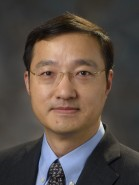
搜索网站、位置和人员

新闻与活动 活动信息
西湖名师论坛第104期 | Zhimin Lu:Cancer metabolism, an old bottle with new wine
时间
2021年9月2日(周四)
10:00-11:30
地点
五号楼一楼学术报告厅
主持
西湖大学生命科学学院谢琦研究员
受众
全体师生
分类
学术与研究
西湖名师论坛第104期 | Zhimin Lu:Cancer metabolism, an old bottle with new wine
时间:2021年9月2日(周四)上午10:00-11:30
Time:10:00-11:30 AM, Thursday, September 2nd, 2021
地点:西湖大学云栖校区5号楼学术报告厅
Venue: Auditorium, 1F, Building 5, Yunqi Campus
主持人:西湖大学生命科学学院谢琦研究员
Host: Dr. Qi Xie, School of Life Sciences, Westlake University

主讲人/Speaker:
吕志民(Zhimin Lu),Professor, Kuancheng Wang Distinguished Chair, Dean of Institute of Translational Medicine, Zhejiang University
浙江大学转化医学研究院院长,浙江省引进培育领军型创新创业团队(肿瘤及代谢性疾病研究创新团队)领军人才,浙江大学王宽诚讲席教授,国家海外人才引进计划专家, 教育部 “长江学者”。原任美国M.D.安德森癌症中心杰出讲席终身教授、肿瘤代谢中心创始主任,是肿瘤代谢研究领域的领军科学家,在肿瘤细胞能量代谢研究中取得了一系列具有开创性和系统性的重要成果。2013年荣获M.D.安德森癌症中心Potu N. Rao基础科学卓越奖、2015年入选美国MD安德森癌症中心Ruby E. Rutherford 杰出冠名教授,2016年荣获美国MD安德森癌症中心基础研究最高奖Dallas/Fort传奇人物基础研究成就奖,2017年入选美国科学促进会会士。
吕志民教授对肿瘤细胞代谢的研究取得了开创性的、系统性的重要成果,是肿瘤代谢研究领域国际知名杰出科学家。先后在世界一流杂志Nature(4篇)、Cell(2篇)、Nature Cell Biology(5篇)、Molecular Cell(15篇)、Cancer Discovery、Cancer Cell、Cell Metabolism、 Nature Reviews Molecular Cell Biology、 Science Advances、Nature Communications, PNAS等发表论文100多篇。其中Cell、Nature、Science系列杂志40余篇,专著2部。
吕志民教授三个原创性里程碑发现深刻影响了业界对肿瘤代谢的认识,同时也对开拓新的肿瘤诊治方法提供了创新理论支持:1. 在国际上首次发现并阐明多种重要的代谢酶同时具有蛋白激酶活性。2. 在国际上首次阐明生长因子受体促进有氧糖酵解Warburg效应的分子机制。3. 在国际上首次证实多种重要的代谢酶和代谢产物在肿瘤细胞活动调控中具有非代谢功能,并发现了多个基于肿瘤特异性能量代谢机理的生物靶点。
吕志明教授受邀担任精准医学杂志荣誉主编,Metabolic Discovery主编, Visualized Cancer Medicine 主编,Journal of National Cancer Center副主编, Cell Research、The Journal of Biological Chemistry等10余个期刊的编委。
报告题目/Title: Cancer metabolism, an old bottle with new wine
讲座摘要/Abstract:
Our research focuses on cancer signaling & metabolism and has made contributions to the cancer metabolism filed by (1) elucidation of instrumental mechanisms of the Warburg effect, (2) discovery of the protein kinase activity of metabolic enzymes, and (3) revelation of the non-metabolic functions of metabolic enzymes in tumorigenesis.
(1) Our work elucidated instrumental mechanisms underlying the regulation of the Warburg effect. We reported that growth factor receptor activation induces translocation of the glycolytic enzyme pyruvate kinase M2 (PKM2) into the nucleus, where it binds to and activates tyrosine-phosphorylated b-catenin (Nature, 2011) and phosphorylates histone H3 (Cell, 2012; listed in the 2012 Signaling Breakthroughs of the Year by Science Signaling), resulting in expression of glycolytic genes and enhanced glucose uptake and lactate production (Nature Cell Biology, 2012; Molecular Cell, 2012). In addition, we revealed that activation of growth factor receptors, expression of K-Ras G12V and B-Raf V600E, and hypoxia induce the mitochondrial translocation of the glycolytic enzyme phosphoglycerate kinase 1 (PGK1), which phosphorylates and activates pyruvate dehydrogenase kinase 1 (PDHK1) to inhibit mitochondrial pyruvate metabolism, thereby promoting the Warburg effect (Molecular Cell, 2016). We also discovered that PTEN suppresses aerobic glycolysis by dephosphorylating and Inhibiting autophosphorylated PGK, and deficiency of PTEN in cancer cells elicits the Warburg effect (Molecular Cell, 2019). Thus, the Warburg effect is regulated by nuclear PKM2, mitochondrial PGK1, and PTEN deficiency-activated cytosolic PGK1 in cancer cells.
(2) Our work discovered that metabolic enzymes (PKM2, PGK1, KHK-A, and PCK1 can function as protein kinases. In addition to the discovery of PKM2 acting as a protein kinase to phosphorylate histone, we demonstrated that PKM2 phosphorylates the spindle assembly protein Bub3 to regulate chromosome segregation and mitotic checkpoint in metaphase and phosphorylates myosin light chain 2 to promote cytokinesis (Molecular Cell, 2014; Nature Communications, 2014). We for the first time reported that hepatocellular carcinoma (HCC) cells alternately splices fructose kinase KHK gene and switch KHK expression from high-activity KHK-C to low-activity KHK-A isoform. KHK-A acts as a protein kinase, phosphorylating and activating phosphoribosyl pyrophosphate synthetase 1 (PRPS1) to promote the de novo nucleic acid synthesis and HCC formation (Nature Cell Biology, 2016) and phosphorylating p62 to activate Nrf2-depdenent antioxidant responses (Science Advances, 2019). Besides our first-time report that mitochondrial PGK1 phosphorylates and activates PDHK1 to regulate mitochondrial function, we demonstrated that PGK1 under energy stress conditions phosphorylates Beclin1 to regulate autophagy (Molecular Cell, 2017). We also revealed for the first time that phosphoenolpyruvate carboxykinase 1 (PCK1) phosphorylates INSIG to activate SREBP and lipogenesis in cancer cells (Nature, 2020).
(3) Our work revealed that metabolic enzymes can possess nonmetabolic functions in regulation of instrumental cellular activities. We demonstrated that metabolic enzymes of PKM2, PGK1, KHK-A, and PCK1 regulate gene expression, mitosis, cytokinesis, de novo nucleic acid synthesis, autophagy, and lipogenesis. In addition, we demonstrated that (a) the metabolic enzyme fumarase regulates DNA repair (Nature Cell Biology, 2015), (b) generation of acetyl-CoA at the promoter regions by nuclear acetyl-CoA synthetase 2 (ACSS2) induces gene expression for lysosomal biogenesis and autophagy (Molecular Cell, 2017), (c) a-KGDH-associated KAT2A acts as a histone H3 succinyltransferase to regulate gene expression (Nature, 2017), (d) Nuclear PGK1 alleviates ADP-dependent inhibition of CDC7 to promote DNA replication (Molecular Cell, 2018), (e) EGFR-phosphorylated platelet isoform of phosphofructokinase 1 (PFPK) activates PI3K in cancer cells (Molecular Cell, 2018), and (f) Programmable base editing of mutated TERT promoter inhibits tumor growth (Nature Cell Biology, 2020).
联系方式/Contact:
科技合作部 sci-tech@westlake.edu.cn

















